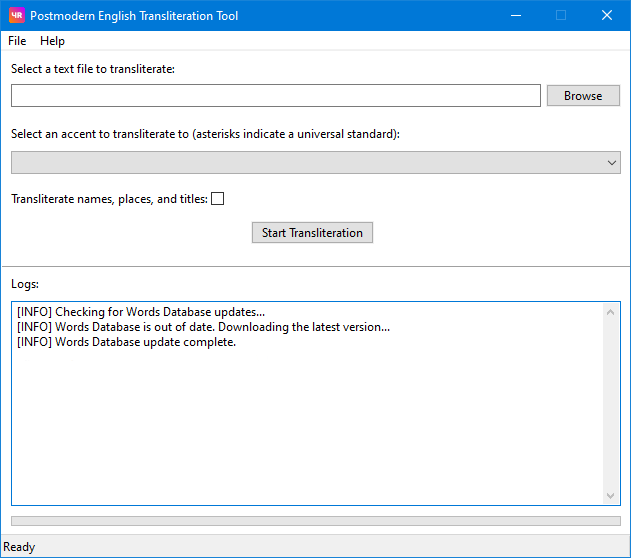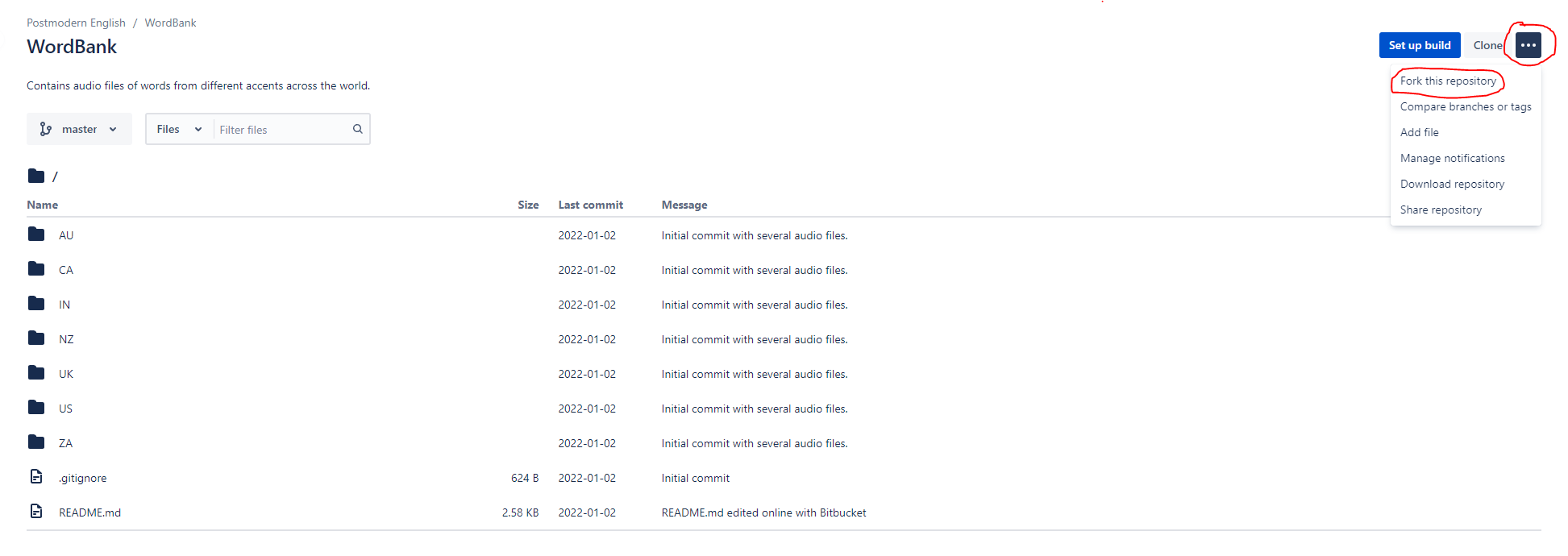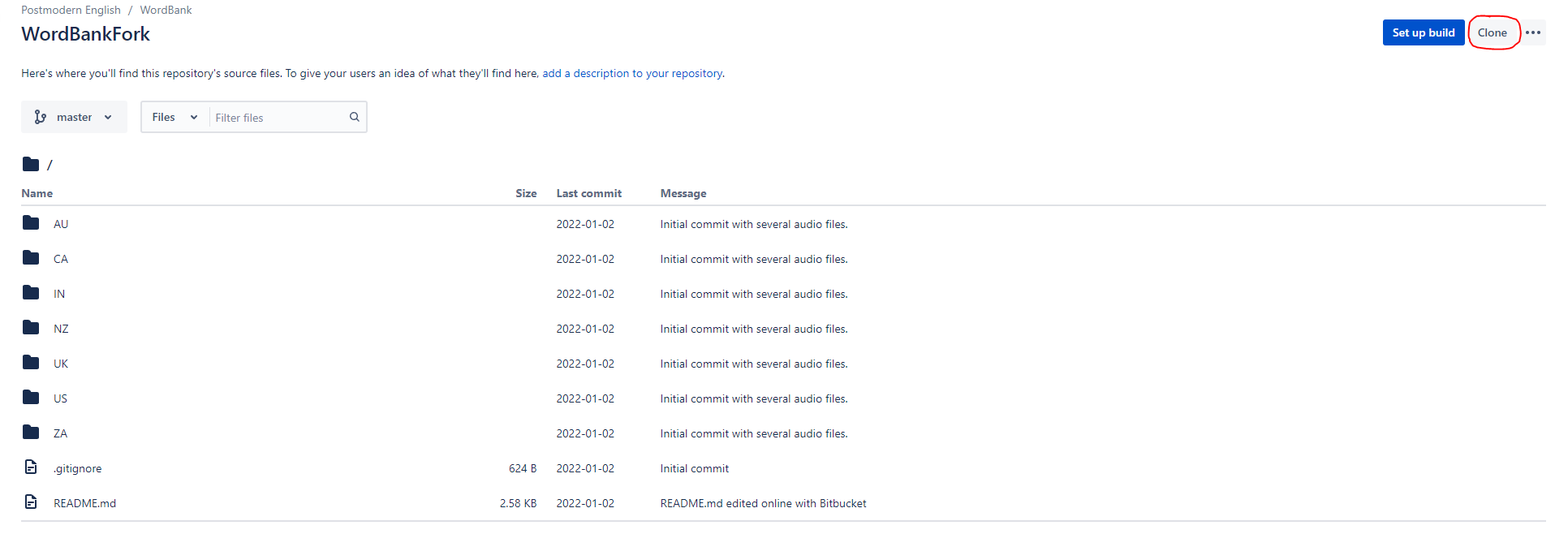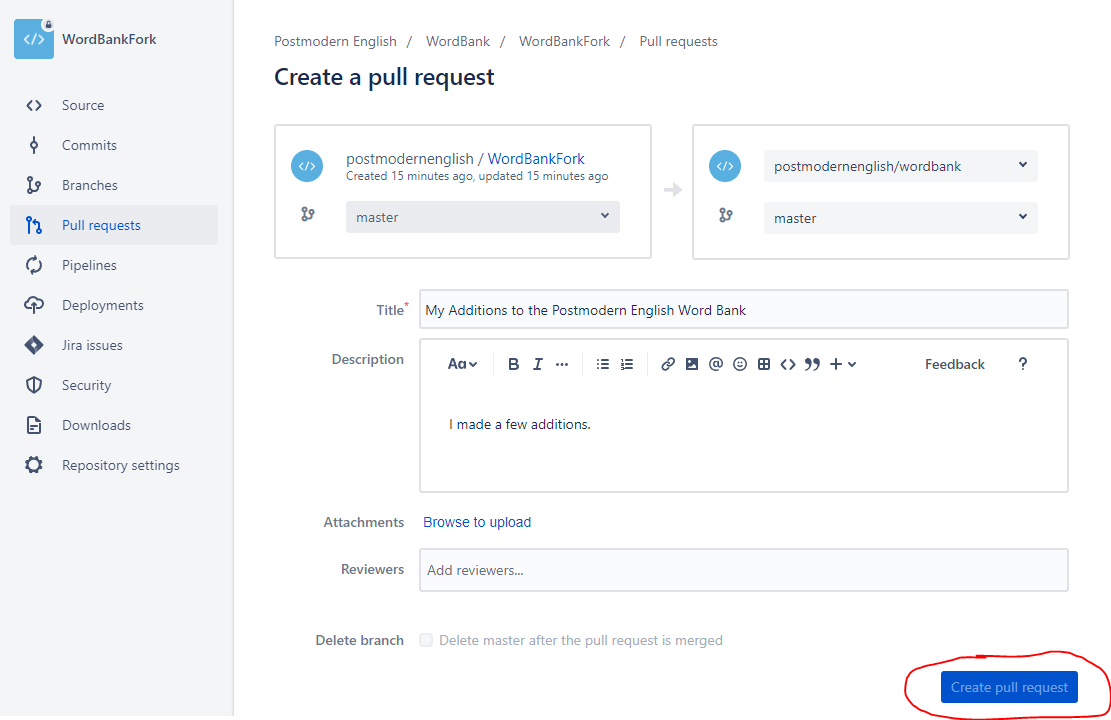
Contribute to the Postmodern English Project
A language is defined by the people who speak it, and not by scholars or traditions. In this spirit of an open language, The Postmodern English Project was created as an open source collaboration to improve English writing for anyone to use. This means that anybody from any place can contribute to the Postmodern English dictionaries, no questions asked. Here’s how it all works:
Audio files of words in accents from around the world are held in our Bitbucket repository. You can think of a repository as a digital library where words are stored.
Anyone can upload audio files of spoken words in their own voice, given that their accent is placed appropriately into the repository.
Once audio files are requested to be added to the repository, our team will review the audio and word spellings for accuracy.
If everything is found to be accurate, our team will approve your audio files, and they will be added to the repository.
Our team will then add all the new words added to the Postmodern English Dictionaries, which are available to the public to use in whichever way needed.
Our goal, ultimately, is to build full Postmodern English dictionaries for every major English accent, so that they can used by anyone or anything. One prime example of this is our own Transliteration Tool, which can automatically turn any English text into Postmodern English text with the help of these dictionaries.
To get started with adding to the Postmodern English dictionary, please follow the instructions below.
Want to Skip the Technical Part?
If you don’t want to use Bitbucket or Git to contribute to the project, no problem! Please email us your word audio submissions at PostmodernEnglish@gmail.com .
When you email us, please specify which accent you are submitting the words to. A list of all accepted accents can be found on our accents page.
Please make sure the words you are submitting haven’t already been submitted for the accent you speak in. To see which words have already been submitted, find your accent folder here.
Please make sure you follow the guidelines for submitting new word audio, which are written here.
How to Start Contributing with Git
If you haven’t already, open a new Bitbucket account. You will need one to start contributing.
Install a repository management tool, such as Git. For almost any operating system, Git Bash is an excellent option.
Head over to our repository page, and head to the Word Bank project page. From there, click on “…” in the top right corner, and then click “Fork this repository”. Set up your fork however you’d like, and create it.
Once you have forked our repository into your own, go to your repository fork, and click on “clone” in the top right corner. Copy the top line that appears in the next window (git clone…).
Having copied the code statement from the clone window in the last step, open your repository management tool, such as git, navigate to the folder where you want to store your fork, and paste in the copied statement. Your fork will be copied to your local machine. If you are unsure how to use Git or Bash, please see using Git and using Bash.
Record your audio files, and put them in the correct accent and letter folders, depending on your accent and the first letter of each word respectively. A great, free audio recording tool you can use is Audacity.
When making new audio files, please make sure you’re following all of the upload rules:
Please make sure that you are putting files in the correct accent and letter folders for each word you upload.
Postmodern audio files must use arguably correct Postmodern English spelling, based on the accent heard. Spelling in Postmodern English is based on how a word sounds when spoken in isolation from any other words. Recordings with additional content beyond the word will not be accepted.
Make sure that the file name is in the format: “(Standard English Spelling) Postmodern spelling of the word in your accent-year recorded.mp3”. All words must have the first letter capitalized in this format.
Audio files must be 200 KB or smaller in size, or else they will not be accepted.
Please only commit MP3 audio files to the WordBank. Any other file type will not be accepted.
When exporting the MP3, please try to normalize the volume of the audio to -1.0 dB. Excessively loud or quiet recordings will not be accepted.
Please ensure that there is not more than 3 seconds of silence before or after the spoken word.
When recording words, please try to reduce background noise as much as possible, so that the word audio can be as clear as possible. Excessively noisy or low quality recordings will not be accepted.
Please record words in a normal speaking voice and tone.
Recorded words must be of your own making, and not taken from somewhere else.
Please don't upload any words or terms which may be subject to copyright.
If a Standard English word has multiple acceptable pronunciations for the same spelling, audio for both pronunciations may be uploaded. For example: Close could mean Kloz (as in closing a door), or Klos (as in getting close to something).
Do not replace any audio files that already exist if they are marked with the current year. For example, if the word "hello" is already in the WordBank for 2021 in the Midland accent, do not replace or upload a duplicate of that word. However, by 2022, the Postmodern Spelling may be contested if you feel it has changed.
If you feel that an important accent has not been listed in this repository, please reach out to the Postmodern English team. Do not add accent folders on your own.
Please only upload 50 or fewer audio files per forked branch. This makes changes easier to review. If you would like to upload more than 50 new files, please create separate forks.
Once you have made your new audio files and have confirmed that they follow our standards, push the changes to your forked branch.
When you are ready to present your changes to us, open a pull request from your forked branch to the master branch of our repository. Be sure to open a pull request to our repository, and not your own.
Once the pull request is open, we’ll begin reviewing the changes for accuracy. If there’s anything we need you to address, we’ll let you know about it with a comment on the pull request.
If we find everything in order, we will merge your changes to our master branch. Congratulations! You will get an email informing you that your changes have been merged.
We will begin the process of adding your new words to the dictionary. Leave it to us!



